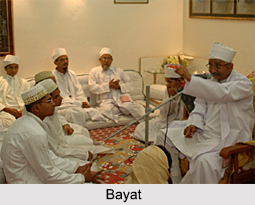 Bayat is the process whereby a student of Sufism is initiated within the folds of the doctrine. During the Bayat ceremony, a disciple`s responsibility is taken over by the Master. The term Bayat literally means one who has been sold i.e. pledged to the Master.
Bayat is the process whereby a student of Sufism is initiated within the folds of the doctrine. During the Bayat ceremony, a disciple`s responsibility is taken over by the Master. The term Bayat literally means one who has been sold i.e. pledged to the Master.
Although there is no direct authority in the Holy Quran enjoining the following of a Pir texts are quoted as supporting the ceremonials connected with Bayat. The purpose of Bayat in the early period of Islam was to affirm allegiance either to Islam or taking an oath of allegiance before proceeding on Jihad or when a man repented for his sins and made up his mind to lead a life of righteousness and piety according to the Shariat. In the last case, he would be required to take an oath before a holy man, affirming that he would not go back to his old ways, by laying his palm on that of Pir, sitting in front of each other.
If a woman was to become a Murid, she would hold one end of a turban cloth, while the Pir would hold the other end or they would both dip their hands in a vessel filled with water simultaneously and utter some prayers. The ceremony of Bayat gradually turned into an essential ritual and it became necessary for the seekers of Truth, who went to surrender before a Pir. In the beginning the Pir used to initiate the disciple directly on the "hand of God", next, on the hand of the Prophet and then lastly, on the hand of his own spiritual Master.
Before surrendering completely to the master, a to-be disciple may satisfy himself or herself in whatever manner he or she wants before surrendering unto him. Use of intellect and discretion is important only up to the stage of seeking the Master. Only that much intellect which may lead one to the door of the real Master is sought and is enough. Having reached the door of the Master, the intellect is of no more use. Rather, it could prove to be an obstruction in the path of spiritual progress. For instance, if someone falls ill, that person would look for a doctor. But the intellect is needed only so long as he needs to find the doctor. Once the doctor has been located his intellect is no longer required, for if he keeps on giving his suggestions to the doctor or keeps on questioning his wisdom in his job, it is of no use, rather it may result in a prolonged or wrong treatment. They know their job best and it needs to be left to them. Similarly, the spiritual Master knows best how to mould his disciple`s character, how to pierce his heart and reach out to its inner recesses.
The teacher, however, can benefit a disciple only if two conditions are met with; there is compatibility between their old impressions (Sanskars) i.e. harmony in their natures, and there is a link or connection (Nisbat) between them. Without these the teacher, howsoever accomplished he may be would not be able to help the disciple. For example if the teacher does not have the inclination towards worshipping in him then it will be extremely difficult for him to help his disciple in doing worship. Similarly if the disciple has the inclination in him to engage in worship but if the teacher has lesser inclination towards it, the benefit flowing to the disciple would also be proportionately less. The greatness and accomplishments of the teacher cannot help the disciple but if there were better harmony between them the benefit also would be equally greater. If a seeker feels that his teacher is very knowledgeable, it indicates that the seeker has more inclination towards acquiring knowledge since the teacher has all the qualities in him but the disciple has the hidden Sanskar of knowledge and, therefore, a better appreciation for the knowledge.
Thus before the process of initiation takes place, the student has to be completely confident about his connection to the Pir under whom he wishes to train. However once the Bayat ceremony takes place, the student is completely under the command of the master as he has literally been `sold` to the master.



















